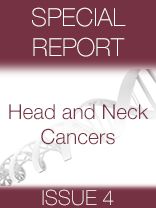Nivolumab Boosts OS in Phase III in SCCHN Study
Anti–PD-1 agent nivolumab boosted overall survival versus an investigator's choice of therapy in platinum-refractory squamous cell carcinoma of the head and neck (SCCHN) during a recent trial.
Melanoma Immunotherapy

Michael Giordano, MD
AntiPD-1 agent nivolumab (Opdivo) boosted overall survival (OS) versus an investigator's choice of therapy in platinum-refractory squamous cell carcinoma of the head and neck (SCCHN) during a recent trial, according to the drug's manufacturer, Bristol-Myers Squibb (BMS).
The study, dubbed CheckMate-141, was stopped early after an independent monitoring panel determined the primary endpoint of improving OS was met with nivolumabversus the investigator's choice of cetuximab, methotrexate, or docetaxel. Eligible patients will be able to continue treatment or cross over to receive nivolumab. Findings from the study are being discussed with the FDA and other health authorities.
“With the results of CheckMate-141, Opdivo moves closer to providing a potential treatment option for patients with head and neck cancer, a cancer with a high unmet need and limited treatment options,” Michael Giordano, MD, senior vice president, head of Oncology Development, Bristol-Myers Squibb. “We look forward to continuing to advance the Opdivo clinical development program in hard-to-treat cancers, such as head and neck cancer.”
The open-label phase III CheckMate-141 study enrolled 361 patients with SCCHN following progression on a platinum-based therapy. All patients in the study had an ECOG performance status of ≤1 and stage III/IV squamous cell carcinoma of the oral cavity, pharynx, or larynx that could not be treated with curative intent. Those with active brain or leptomeningeal metastases were excluded from the study.
Patients were randomized in a 2:1 ratio to nivolumab at 3 mg/kg every 2 weeks or either cetuximab, methotrexate, or docetaxel. Cetuximab was administered at 400 mg/m2 for the first dose followed by 250 mg/m2 weekly. Methotrexate was administered at 40 or 60 mg/m2 weekly. Docetaxel was administered at 30 or 40 mg/m2 weekly.
The primary endpoint was OS, with secondary outcome measures focused on response rates and progression-free survival. The study was initiated in May 2014 and was not scheduled to complete until October 2016. Findings from the study are being prepared for presentation and publication. At this time, BMS has not yet released any data from the CheckMate-141 trial.
The positive findings from CheckMate-141 join an ever-growing collection of data supporting PD-1 inhibition across types of cancer. Following an impressive early demonstration of efficacy for nivolumab at the 2012 ASCO Annual Meeting, the agent has gained more than a half dozen indications.
The FDA initially approved nivolumab as a treatment for patients with melanoma in December 2014. Worldwide the agent became the first PD-1 inhibitor to gain approval in July 2014, following an approval in Japan.
Since the first indication, nivolumab has also gained approval as a single-agent and in combination with ipilimumab (Yervoy) for patients with advanced melanoma, regardless of BRAF status. Moreover, the agent is approved as a single-agent for patients with pretreated nonsmall cell lung cancer (NSCLC) regardless of histology and for those with advanced renal cell carcinoma followed a prior VEGF-targeted therapy.
Along with nivolumab, a host of therapies have joined the immune checkpoint inhibitor development race. Chief among the competition is pembrolizumab (Keytruda), which has also gained approval for advanced melanoma and for PD-L1positive pretreated NSCLC. Other similar agents are also in development that targeted the ligand, PD-L1. These therapies, primarily atezolizumab, durvalumab, and avelumab, have yet to gain FDA approval.
Initial evidence supporting PD-1 inhibition in head and neck cancer was first seen with pembrolizumab in the phase I KEYNOTE-012 study. Many anticipated that phase III findings would also come first from pembrolizumab; however, BMS decided to omit early phase development and instead went straight to a phase III trial. As such, there is limited data currently available for the agent in SCCHN.
For pembrolizumab the objective response rate was 24.8% in 117 evaluable patients enrolled in the KEYNOTE-012 study. Tumor shrinkage was experienced by 56% of patients and another 25% had stable disease.
The response rate seen with pembrolizumab was similar, regardless of HPV infection status. In those with HPV-positive disease, the ORR was 20.6% compared with 27.2% in the negative group. HPV status was not a consideration in the enrollment criteria for the CheckMate-141 study.
Two phase III studies were initiated to explore pembrolizumab further in head and neck cancer, both of which are still enrolling participants. One was initiated in September 2014 and the other in February 2015. Findings from these investigations are not anticipated until 2017 (NCT02358031 and NCT02252042).
References
- Seiwert TY, Haddad RI, Gupta S, et al. Antitumor activity of the anti-PD-1 antibody pembrolizumab in biomarker-unselected patients with R/M head and neck cancer: preliminary results from the KEYNOTE-012 expansion cohort. J Clin Oncol. 2015;(suppl; abstr LBA6008).

Survivorship Care Promotes Evidence-Based Approaches for Quality of Life and Beyond
March 21st 2025Frank J. Penedo, PhD, explains the challenges of survivorship care for patients with cancer and how he implements programs to support patients’ emotional, physical, and practical needs.
Read More